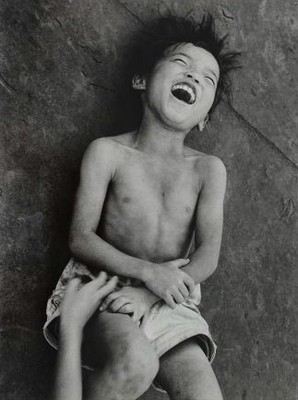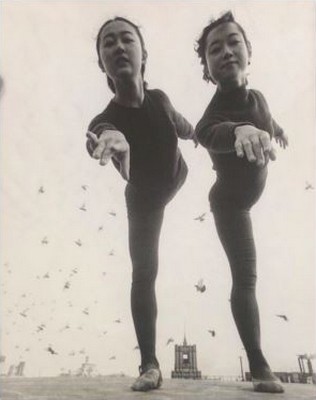OKASHI
Michael Hoppen Gallery, London
13 April - 30 June 2024
Ordeal by Roses #32, 1961
© Courtesy Michael Hoppen Gallery
The Michael Hoppen Gallery presents a kaleidoscope of works crossing centuries, genre, and media, to reveal a different interpretation of Japan – neither a delicate vision of the Floating World, nor the kawaii kitsch of Hello Kitty’s homeland.
The concept of okashi has been used throughout Japanese aesthetic history to refer to those things which delight for their strangeness, their humour, or their power to intrigue. This show illustrates an eclectic understanding of Japan’s visual identity by including photographs, vintage textiles, rich colourful avant-garde theatre posters, woodblock shunga prints and unusual objects, such as Netsuke and Harigata, contextualising the gallery’s interest in Japanese culture.
‘My fascination with Japan was first provoked by seeing Japanese photobooks and magazines as a young photographer in the 1970's. When I first visited Japan 20 years ago, I was completely blown away by its energy and diversity. Whilst photography was, and remains, my key passion, I was enthralled and seduced by almost everything I laid eyes on.’ - Michael Hoppen
Michael Hoppen has travelled back and forth to Japan ever since and built up a varied and personal collection of Japanese materials. Okashi includes a collection of 1800s engravings which features depictions of ohaguro – the ancient Japanese practice of teeth blackening, a custom deemed alluring and beautiful which delighted in its strangeness.
Sachin, 1963
© Courtesy Michael Hoppen Gallery
Ballet dancers, Tokyo, 1954
© Courtesy Michael Hoppen Gallery
‘Okashi’ gives a lively contextual backdrop against which to display works by Eikoh Hosoe from Ordeal by Roses (1963), the legendary collaborative series of portraits of author Yukio Mishima taken by this influential photographer. Included in the exhibition are other important and rare works by Masahisa Fukase from his seminal project ‘The Solitude of Ravens’, and important early works by other post-war legendary artists including Daido Moriyama, Masitoshi Naito, Shomei Tomatsu and Gen Ōtsuka, including his pictures of the Tokyo Ballet and Komaki Ballet companies.
During his hunt for Japanese photography, Michael Hoppen found himself drawn to the many other cultural mediums including Japan’s rich textile tradition, particularly those dyed with the distinctive indigo sometimes described as ‘Japan blue’. ‘The lack of authorship in the kimonos and other varied textiles such as rare pieces of ‘borrow’, allowed me to look at them in a way that brought very little baggage. I judged them purely on an aesthetic basis, on colour, detail, what their purpose had been, and not based on who had made them. I concentrated on finding things that pleased my eye.’
A rare 19th century fireman’s jacket in extraordinary condition with an intricate and colourful illustration of an amorous couple on the inside is a highlight of the exhibition.
Also included are fine examples of 19th century Japanese shunga, theatre portraits and other fascinating scenes mixed with strange and beautiful objects brought from Japan. These are include Harigata from the Edo period and early Edo period lacquered plaster grotesque masks. An extraordinary selection of avant garde Japanese theatre posters and stunning examples of Tananoori Yokoo’s work, long celebrated as one of the most influential graphic artists to emerge from Japan in the 1970s and 1980s.
MICHAEL HOPPEN GALLERY
10 Portland Road, London, W11 4LA



